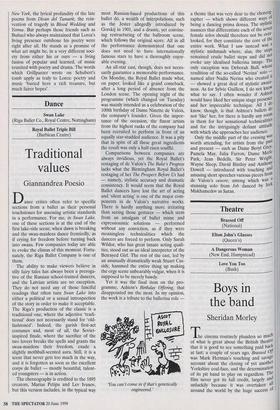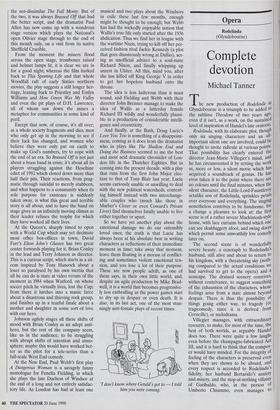Theatre
Brassed Off (National) Elton John's Glasses (Queen's) A Dangerous Woman (New End, Hampstead) Love You Too (Bush)
Boys in the band
Sheridan Morley
the cinema routinely plunders so much of what is great about the British theatre that it is good to see something paid back, at last; a couple of years ago, Brassed Off was Mark Herman's touching and savage account about the closing of yet another Yorkshire coal-face, and the determination of its pit band to play on regardless. The, film never got its full credit, largely an°, unluckily because it was overtaken 31' around the world by the huge success of the not-dissimilar The Full Monty. But of the two, it was always Brassed Off that had the better script, and the dramatist Paul Allen has now come up with a wondrous stage version which plays the National's open Olivier stage through to the end of this month only, on a visit from its native Sheffield Crucible.
From the moment the miners flood across the open stage, trombones raised and helmet lamps lit, it is clear we are in for a good night; whereas the film harked back to This Sporting Life and that whole Woodfall raft of early Sixties northern movies, the play suggests a still longer her- itage, leaning back to Priestley and Emlyn Williams and How Green Was My Valley and even the pit plays of D.H. Lawrence, all of whom saw down the mines a metaphor for communities in some kind of peril.
Except that now, of course, it's all over; as a whole society fragments and dies, men who only get up in the morning to see if their luck has changed, and women who believe they were only put on earth to make up God's numbers, try to cope with the end of an era. So Brassed Off is not just about a brass band in crisis; it's about all its players struggling against the Heseltine edict of 1992 which closed down more than half their pits. Their reactions, from prag- matic through suicidal to merely stubborn, and what happens to a community when its sole purpose for existence is suddenly taken away, is what this great and terrible story is all about, and to have the band on stage gives us an infinitely moving climax as their leader refuses the trophy for which they have worked all their lives.
At the Queen's, sharply timed to open with a World Cup which may yet decimate most other box-offices in town, David Farr's Elton John's Glasses has two great centre forwards playing for it, Brian Conley in the lead and Terry Johnson as director. This is a curious script, which starts as a sit- com inspired by Tony Hancock about a loser so paralysed by his own inertia that all he can do is stare at video reruns of the moment in 1984 when Watford, on whose soccer pitch he virtually lives, lost the Cup; from there it lurches into a manic farce about a disastrous and thieving rock group, and finishes up in a tearful finale about a mother and daughter in some sort of love with our hero.
Johnson agilely stages all these shifts of mood with Brian Conley as an adept anti- hero, but the rest of the company seem, like us in the audience, to be struggling with abrupt shifts of intention and atmo- sphere; maybe this would have worked bet- ter as the pilot for a tele-series than a full-scale West End comedy.
At the New End, Paul Webb's first play A Dangerous Woman is a savagely funny monologue for Fenella Fielding, in which she plays the late Duchess of Windsor at the end of a long and not entirely satisfac- tory life. As London has had at least one musical and two plays about the Windsors in exile these last few months, enough might be thought to be enough; but Webb has had the wickedly enjoyable notion that Wallis's true life only started after the 1936 abdication. Thus we find her in league with the wartime Nazis, trying to kill off her per- ceived fashion rival Jackie Kennedy (a plot that goes disastrously wrong at Dallas), act- ing as unofficial adviser to a soul-mate Richard Nixon, and finally whipping up unrest in Ulster. All this, mind you, after she has killed off King George V in order to get her hopeless husband onto the throne.
The idea is less ludicrous than it must sound, and Fielding and Webb with their director John Brenner manage to make the idea of Wallis as a latterday female Richard III wildly and wonderfully plausi- ble in a production of considerable intelli- gence and eccentricity.
And finally, at the Bush, Doug Lucie's Love You Too is something of a disappoint- ment, coming as it does from the dramatist who in plays like The Shallow End and Doing the Business seemed to me the best and most acid dramatic chronicler of Lon- don life in the Thatcher Eighties. But in coming into the present decade, with a play that runs from the first John Major elec- tion to that of Tony Blair last year, Lucie seems curiously unable or unwilling to deal with the new political watersheds, content- ing himself instead with two interchange- able couples who (much like those in Marber's Closer or even Coward's Private Lives) find themselves fatally unable to live either together or apart.
So we have yet another play about the emotional damage we do our ostensibly loved ones; the truth is that Lucie has always been at his absolute best in writing characters as reflections of their immediate moment in time; take away that moment, leave them floating in a morass of conflict- ing and sometimes violent emotional ten- sion, and you lose a lot of their purpose. These are now people adrift, as one of them says, in their own little world, and, despite an agile production by Mike Brad- well, it is a world that becomes progressive- ly less enthralling as the power games start to dry up in despair or even death. It is also, in its last act, one of the most stun- ningly anti-female plays of recent times.
`I don't know where Gerald's got to — I told him you were coming.'



























































 Previous page
Previous page